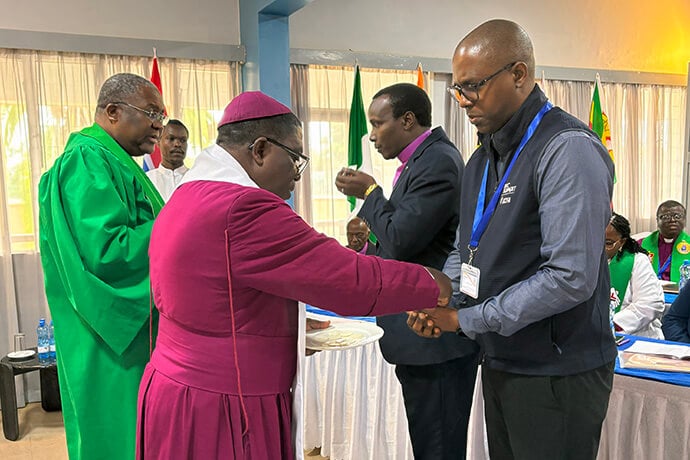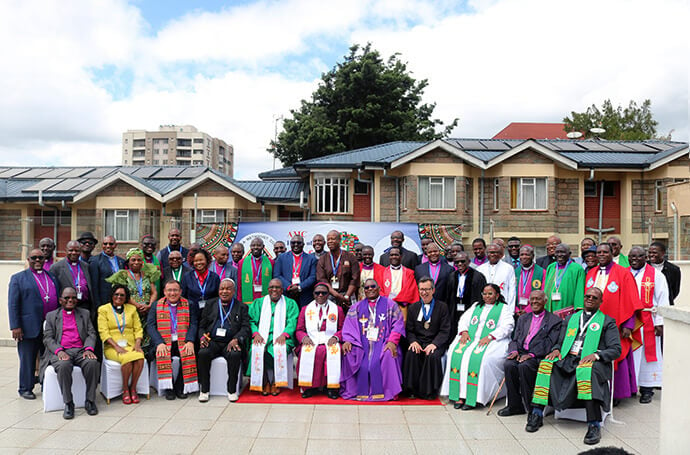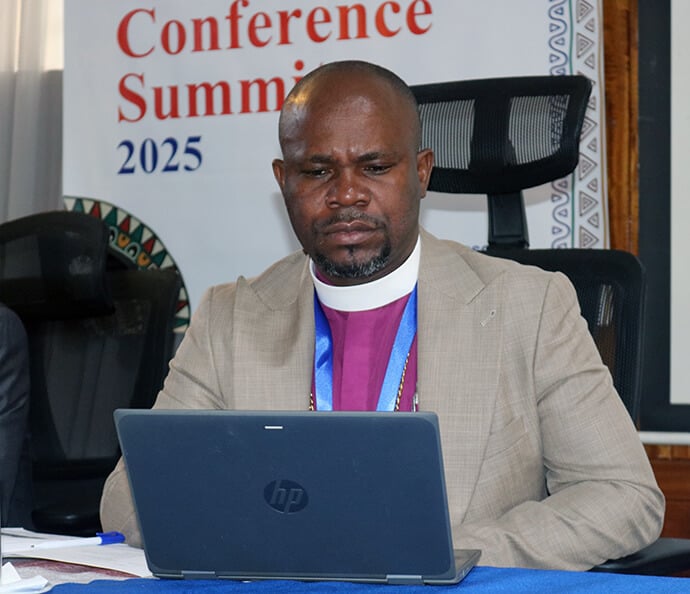Key points:
- Regionalization of The United Methodist Church will affect all African Methodists, said United Methodist Bishop Ande I. Emmanuel of Nigeria.
- A World Methodist Council executive called on the church to remain united and discuss differences around the holy table of the Lord.
- Churches should create spaces for women in episcopal leadership as they make the majority of membership, said the sole female bishop at the Methodist leaders gathering.
Leaders of Methodist denominations have pledged to support each other as Methodism continues to thrive and grow on the African continent despite myriad challenges.
Heads of 55 denominations acknowledged the Methodist movement was facing challenges that can be overcome if they stand united. The Africa Methodist Council members met May 14-19 in Nairobi, Kenya, under the theme “Transformation of the Socio-political and Economic Landscape of Africa: The Methodist Factor.”
“The meeting reflected not only the unity of the Methodist people across Africa, but also the enduring commitment to uphold the values of faith, justice and compassion that have guided Methodists for generations,” said the Most Rev. Paul Kwabena Boafo, Africa Methodist Council president. He is also the presiding bishop of the Methodist Church Ghana.
“It was not just a meeting of leaders — it was a convening of hearts, minds and spirits united by a common mission: to serve God faithfully and to advance the work of the kingdom across the African continent,” he said.

The church leaders had the opportunity to learn about the proposed worldwide regionalization currently up for ratification votes in The United Methodist Church. It was an opportunity for other members of the Wesleyan movement to understand how regionalization would affect Methodism on the continent.
Bishop Ande I. Emmanuel, who leads United Methodists in Nigeria, Cameroon and Senegal, said regionalization would affect not only The United Methodist Church but also African Methodism as a whole.
Under regionalization, the U.S. and each central conference — United Methodist regions in Africa, Europe and the Philippines — would become regional conferences with the same authority to adapt parts of the Book of Discipline, the denomination’s policy book, for more missional effectiveness.
“Its impact goes beyond our imagination,” Emmanuel said. “It is a plan that has given Africa the autonomy to contextualize its theology and its ministry in its own context.
“Today this is something Africa needs, so the impact of contextualization goes beyond The United Methodist Church but to all African Methodists. It brings back our contextual theology which Africa is known for,” he explained.
Bishop Isaiah Deye of the Methodist Church in Kenya observed that “Africa stands at a crossroads.”
“It is rich in resources, heritage and faith,” he said. “Yet it is burdened by poverty, corruption, weak governance and socio-economic injustice. Transformation is not only a political or economic necessity — it is a spiritual imperative.”

The Rev. Reynaldo Ferreira Leão Neto, top executive of the World Methodist Council, encouraged Methodists to remain united. “United we are stronger than separate,” he said. “The Lord calls us to be one body who share the same bread and the same cup.”
The leader of the worldwide ecumenical association, which brings together about 80 denominations across six continents, commented on the conflicts in the church in Africa — particularly in The United Methodist Church in Nigeria and Liberia.
“Divisions in the church have to be addressed around the holy table of the Lord to bring fellowship,” he said. “If we are able to sit at the table, understand each other, respect each other allowing space for differences, then maybe we can have the fellowship the Lord invites us to have around the table and to be one body.”
Neto told UM News: “We are called to be one and one we should be. That’s my prayer for the churches in Africa. We have heard of many problems including violence. That’s not the way of Christ. We reject it and affirm the way of Christ: the way of love, of embracing and respecting each other.”
Learn more
In a statement at the close of the heads of Methodist conferences summit convened by the Africa Methodist Council, bishops and their representatives committed to work with other faith-based organizations and address challenges of migration and internally displaced people.
Bishop Juan de Dios Pena Gallegos of CIEMAL, the council of evangelical Methodist churches in Latin America and the Caribbean, said African Methodists were united. “There is a genuine interest among the member churches to work together, despite the diversity represented within them, which is both encouraging and inspiring,”
Gallegos said it was striking to see how many of the challenges faced by the African Methodist Council are very similar to those faced by CIEMAL.
“I was deeply impressed by the strength that emerges from joint work, and by how the leadership of African Methodists can truly influence the transformation of communities. It is uplifting to witness how the Methodist people in Africa are alive and radiant in their witness and mission,” he said.
Reflecting on the meeting, Emmanuel said: “For the social and political upliftment of Africa, we need the Methodist Church to come together. This ecumenical body of Methodists has the potential to change the political, economic and religious landscape as a continent.”
“We are going to do that by coming together as a Methodist family, by discussing and challenging each other on how we can go and approach political and economic issues within our domain bringing us together will give us the power to strategize in order to move forward,” he told UM News.

Emmanuel, who was the only United Methodist episcopal leader at the gathering, said he expected more United Methodist bishops at the next conference planned for May next year. “This is a place for us,” he said. “We have the potential to lead African Methodism to ensure that we strengthen and contextualize our theology and our church in a way that will better serve ministry in Africa.”
Africa has had a few women bishops; The United Methodist Church in Africa has only had one — Bishop Joaquina F. Nhanala, who retired in March. She previously led United Methodists in Mozambique, South Africa and Madagascar.
The sole female bishop at the Methodist leaders gathering, Phumla Nzimande of the Methodist Church of South Africa, said most grassroots members are women and they should be equally represented in leadership.
Subscribe to our
e-newsletter
“There should be an intentionality about creating spaces for women to not only be around the table but to also be at the head of the table. I have a sense that we feel that we have achieved but we should be equally represented at such forums,” she said.
“It is also the mentorship of girls from a young age because unfortunately we are socialized in a very patriarchal world. In as much as we think we are modernized, most girl children are taught internalized subordination while the boy child is taught internalized dominance,” explained Nzimande.
The Rev. Martin Mujinga, Africa Methodist Council general secretary, said the leaders’ summit confirmed that Africa is the hub of 21st century Christianity. “Methodists are part of this worldwide expansion and the meeting demonstrated that the problem of one denomination is a problem for all,” he said. “Theologizing, speaking truth to power, ecclesiology and connectionalism are the tenets that should define Methodism in Africa.”
The Africa Methodist Council is a Pan-African association of Methodist, Wesleyan, and related Uniting and United Churches. The council aims to encourage Methodist unity in witness, facilitate mission in Africa, and foster ecumenical and inter-religious activities that will enhance Methodism within Africa and promote the unity of the Methodist family in Africa, showcasing the African identity through the Wesleyan movement.
Chikwanah is a UM News correspondent based in Harare, Zimbabwe.
News media contact: Julie Dwyer at (615) 742-5470 or [email protected]. To read more United Methodist news, subscribe to the free UM News Digests.




